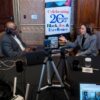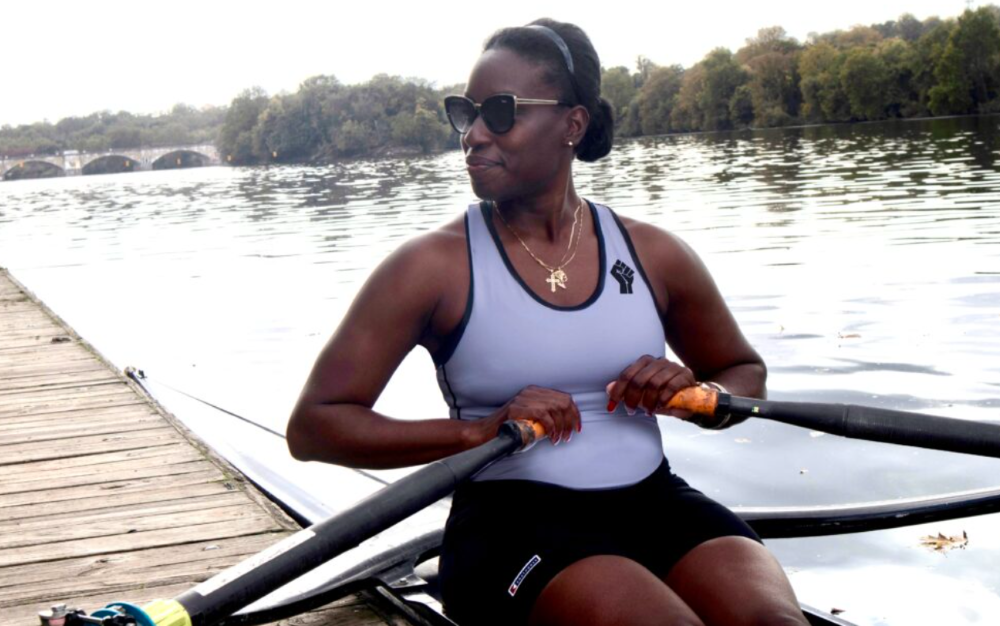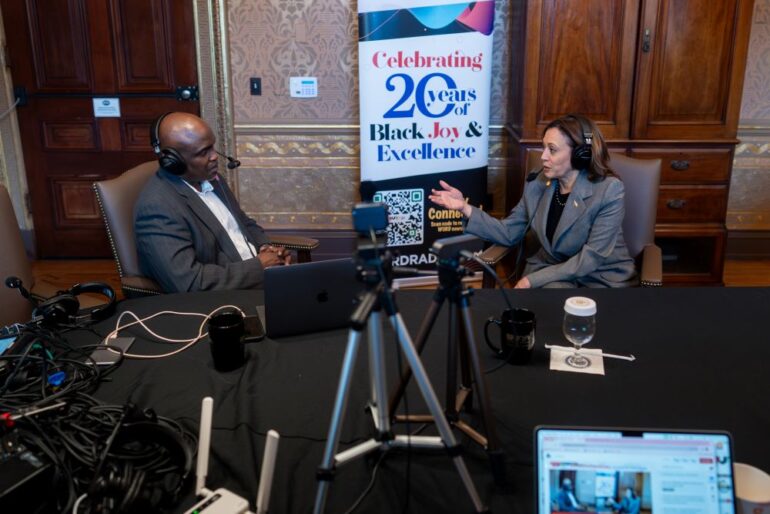-
play_arrow
WURD Radio
This article was originally published by Love Now Media.
By Kristin Holmes | Love Now Media
Photo credit: BLJ Community Rowing
The tranquility of the Schuylkill River calls out to Brannon Johnson every morning at 6:30 a.m. when she steps into her wobbling single scull – a narrow racing boat for one person, sits down, and grips the oars.
With a push-off from the dock, Johnson sets off for a 57-minute trip down the waterway in what she calls “the most peaceful” part of her day.
When she returns, feeling restored, this founder of the only African American-owned rowing club in the nation, resumes her daunting commitment. She and other African American women rowers such as Asiya Mahmud and Jill Roberts have found a home, of sorts, in what might seem an unlikely place.
Rowing’s comradery, teamwork and experience-expanding opportunities have enriched their lives. All are committed to diversifying the ranks within the sport and are working toward it in their own way.
“It was a vehicle to a better life for me. I feel extremely grateful and incredibly responsible to give that opportunity to as many people as possible,” Johnson said.
She is achieving that goal of providing diverse rowing opportunities mostly through BLJ Community Rowing, the club Johnson founded in 2013. Since then, she has taught more than 1,500 people to row. More than 50 percent of her students have been Black and Brown people from the Pennsylvania, New Jersey, Delaware Tri-State area.
Her students are entering the domain of a sport with roots in ancient Egypt that evolved into an exclusive pastime of white upper-class men who could afford the expense of lessons and equipment.
But along the way, there were the barrier-breakers. Among them: Frenchy Johnson rowed professionally in the 1870s, becoming the first prominent African American rower. Mario Bryan became the first Black member of the Harvard University crew team in the 1950s. In Philadelphia, teacher Helen Wilcher started a rowing program for Black and Brown youngsters at East Falls’ Camp Dimension in the 1970s; meanwhile, Anita DeFrantz honed her sculling skills and went on to serve as captain of the U.S. rowing team at the 1976 Olympics, winning a bronze medal.
Those trailblazers have set the stage for rowers who are making their own kind of contribution: Johnson with her club, Mahmud as a coach with Drexel University’s rowing program as well as the US Rowing Association, and Roberts lobbying for access during volunteer work as a member of the Philadelphia Girls’ Rowing Club.
But the rowing connection for all of them began with parents who were seeking a healthy recreational pastime for their daughters. For Mahmud, who was homeschooled, soccer, ballet and then rowing were social outlets. Her sister rowed on a team and Mahmud spent her weekends at regattas. When she enrolled in high school, Mahmud joined the rowing program.
“I loved the team dynamic, the collective effort of everyone being in unison,” Mahmud said. “It was a feeling I wanted to do again and again. That’s what got me hooked.”
Johnson wasn’t hooked. She started rowing in a summer camp as part of her parents’ strategy to keep their children busy and away from the perils of growing up in a tough city neighborhood.
“It was a very white space and I was uncomfortable,” Johnson said. Expressing love for the sport, she admits it “pushes your boundaries and requires lots of mental work and physical anguish.”
For Roberts and her college-athlete dad, the love of sport was paramount. Roberts rode bikes, worked as a lifeguard, and played field hockey and softball. She did it in mostly white spaces, in a boarding school and then a small predominantly white women’s college. By the time Roberts started rowing after graduation, being one of the only Brown faces in the room was a regular occurrence.
“I am not going to let historic inequities hold me back from things I want to do,” Roberts said.
That inequality did not appear as blatant racism for Mahmud, but she has always felt “the need to fit in.” A more harmful offshoot found its way to Johnson by way of a banana peel placed in her boat during high school.
“When you get and start beating people there is going to be kickback. Incidents are a very regular thing for sure,” she said.
But Johnson endured it because she began to see what rowing could do for her. She started to travel, attend training camps and get recruited by colleges. Rowing could be a vehicle to a better life, especially after the sport began focusing on diversity.
Johnson attended the University of Texas on a full scholarship, won medals and competed in prestigious races including the Henley Royal Regatta in London. She found her mission in rowing – starting her club and introducing others to the sport and the opportunities they could derive from it.
Rowing has also led to a career for Mahmud, who as Associate Head Rowing Coach at Drexel, now teaches students about the teamwork she so loved. But for Roberts, rowing’s comradery has meant something deeper. Through sports, she found community, one that feels like family. Even so, she said the challenge of diversity in rowing remains. And, subsequently, so too does her commitment:
“If you have the desire and intestinal fortitude to deal with it, come,” Roberts said. “If you go to a boathouse and they’re not nice to you, come to mine.”
THE WURD WEEKLY NEWSLETTER
Black Talk Media sent straight to your inbox.
BECOME A MEMBER
The forWURD Movement is your way to
protect and preserve Independent Black Media.
Written by: Associated Contributor
Asiya Mahmud black owned business BLJ Community Rowing Brannon Johnson Kristin Holmes Love Now Media rowing Schuylkill River teamwork tri state area
Similar posts
New partnership with Spotlight PA to provide the Allegheny County with more investigative and public-service journalism
Christopher Baxter is the executive director and editor in chief of Spotlight PAFor the past decade, there’s been nothing short of a crisis in our state capital.More and more of Pennsylvania’s sprawling and costly bureaucracy operated without scrutiny from investigative reporters, the watchdogs tracking how our hard-earned tax dollars are […]
Featured post
Latest posts

This week on WURD: Trump assassination attempt, remembering Kobe Bryant’s father Joe Bryant, Federal aid for homeowners with fixer-uppers

If Biden steps off the ticket, there is only one person who should replace him

Moving Forward: A Statement of Unity and Healing

This week on WURD: Project 2025, How to stay cool through the heatwave, Philly’s summer street cleaning

This week on WURD: Supreme Court broadens presidential immunity and punitive measures on homelessness, an organization striving for Black youth in STEAM fields
Current show
Upcoming shows
Electric Magazine
7:00 am - 8:00 am

Conversations with the Commissioners
8:00 am - 9:00 am
Dr. Paul’s Holistic Health Hour
9:00 am - 10:00 am

Saturdays with City Council
10:00 am - 11:00 am
The Murray Report
11:00 am - 1:00 pm
WURD Radio LLC © 2012-2021. All rights reserved.







Post comments (0)